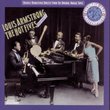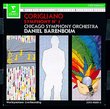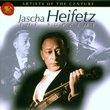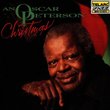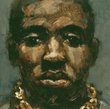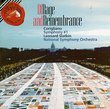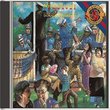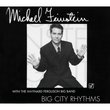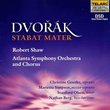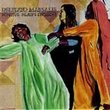| All Artists: Edward Elgar, Ralph Vaughan Williams, Simon Rattle Title: Elgar: Violin Concerto Ralph Vaughan Williams: The Lark Ascending and Kennedy: Simon Rattle City of Birmingham Symphony Orchestra Members Wishing: 0 Total Copies: 0 Label: Angel Records Release Date: 1/20/1998 Album Type: Import Genre: Classical Styles: Forms & Genres, Concertos, Historical Periods, Modern, 20th, & 21st Century, Instruments, Strings, Symphonies Number of Discs: 1 SwapaCD Credits: 1 UPC: 724355641328 |
Search - Edward Elgar, Ralph Vaughan Williams, Simon Rattle :: Elgar: Violin Concerto Ralph Vaughan Williams: The Lark Ascending and Kennedy: Simon Rattle City of Birmingham Symphony Orchestra
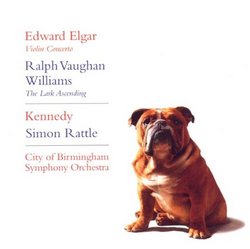 | Edward Elgar, Ralph Vaughan Williams, Simon Rattle Elgar: Violin Concerto Ralph Vaughan Williams: The Lark Ascending and Kennedy: Simon Rattle City of Birmingham Symphony Orchestra Genre: Classical
In July 1997, after a five-year self-imposed exile from the world of classical music, Nigel Kennedy--now known simply as Kennedy--returned to the scene of one of his earlier triumphs with this incident-packed account of t... more » |
Larger Image |
CD DetailsSynopsis
Amazon.com In July 1997, after a five-year self-imposed exile from the world of classical music, Nigel Kennedy--now known simply as Kennedy--returned to the scene of one of his earlier triumphs with this incident-packed account of the Elgar concerto. It's a reading that, in the first two movements, at least, displays a bristling temperament, rapt ardor, and go-for-broke spontaneity rare in a studio recording. In the opening Allegro, Kennedy's superbly commanding first entry as well as his ravishing handling of the "Windflower" second subject movingly recall Albert Sammons's miraculous 1929 recording with Sir Henry Wood (and there can be no higher praise than that). Oddly, the finale is not quite on the same level, being somewhat too brusque and calculated for comfort (Kennedy's playing in the exquisite cadenza was more moving in his earlier recording with Vernon Handley). Overall, though, it's a thrilling display, brimming with charisma and imaginative insight. Kennedy and Rattle's incredibly leisurely, self-consciously luxuriant way with The Lark Ascending (one of Vaughan Williams's most sublimely evocative nature poems) will probably not be everyone's cup of tea, but their performance of the Elgar simply must be experienced. --Andrew Achenbach Similarly Requested CDs
|
CD ReviewsKennedy's Remake of the Elgar Violin Concerto KH | Chicago, IL | 04/11/2000 (5 out of 5 stars) "This is Kennedy's second recording of this work--the first was with Vernon Handly and the London Phil, also for EMI. That first recording was excellent, though pretty straightforward. This remake is truly bizarre in many ways, yet ultimately the most moving recording of the work yet made. It is one of the slowest recordings of this music, but there is great pulse and variety within each movement--generally, Kennedy lingers when he takes the center stage, and Rattle and the orchestra inject impetuosity when they take center stage. It makes for a tug of war, but ultimately an exciting one. Kennedy obviously loves this work--no one has ever played it better. Some may say he loves it to death, fiddling with tempi, drawing out a phrase here, digging into one there. To me, it all adds up to an intensely personal and emotional performance.Recorded sound is first rate. Rattle and his orchestra are world class, bold and fierce where appropriate, meltingly beautiful when needed. If I could only have one recording of this music, it would be this one; however, people learning the work for the first time may find Kennedy's first recording more cogent and approachable.The Lark Ascending is by far the slowest recording ever; it's amazing Kennedy can maintain his intonation at the end. Some may find the performance grotesquely drawn out; again, I hear a deeply felt performance." A worthy companion to the historic recordings Jay | Republic of Ireland | 10/26/2002 (5 out of 5 stars) "OK I confess, I have never rated Kennedy as a soloist. Particularly when I compare him with Menuhin, Oistrakh ,Heifetz or even Vengerov, but this recording has made me reconsider. For me most studio recordings of classical music made during the last 15 - 20 years have a homogeneous quality which leaves precious little room for artistic interpretation. With that in mind I find Kennedy's spontaneity in the Lark Ascending and the first and second movements of the concerto a refreshing break with convention and a little more in the finale would have added greatly to the whole. After growing up listening to the great Menuhin/Elgar recording on LP belonging to my late uncle and being reintroduced to it via the even better Sammons/Wood performance when I was in university, I honestly wasn't expecting much from this CD, but I was oh so happy to be wrong. As great as the old recordings are - and they remain the touchstone recordings - there are times for me, when the 78rpm sourced sound can get in the way of the music and make me long for a great stereo performance. Now I have it and many late (and enjoyable!) nights have been spent in the company of this CD. If you are looking for a modern recording of the Elgar Concerto, this is the one. Period!" Nigel Kennedy: There Really IS a Musician Beneath the Hype Karl Henning | Boston, MA | 11/16/2001 (5 out of 5 stars) "Even if he had not written a great deal of other brilliant music, Elgar's concerti for violin and violoncello assure him a place among music's immortals. Nigel Kennedy does a great job here; he and Simon Rattle work so well together here, it is a shame that Kennedy's famous temperament doesn't permit him to work with Rattle more (but maybe Rattle is temperamental too, who knows?)The one time I heard Kennedy live, my shoulder was tapped to turn pages for his accompanist in the Elgar violin sonata. Before that afternoon, I hadn't realized Elgar ever wrote a violin sonata. The brilliance of that piece, and the brilliance of Nigel's performance that day (he also played his heart out in the Bartók solo sonata) are captured unfailingly in all this disc, for all its being a different occasion and different music.Had never heard the Vaughan Williams before; marvelous, gossamer, magical."
|

 Track Listings (4) - Disc #1
Track Listings (4) - Disc #1